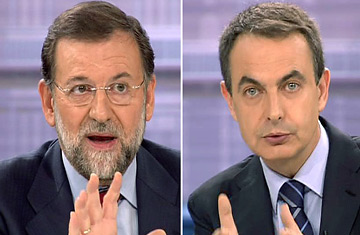
Spain's Prime Minister Jose Luis Rodriguez Zapatero (R) and opposition Popular Party leader Mariano Rajoy (L) speak during a televised debate between the two candidates in Madrid
Spain's electoral campaign has never been a decorous affair, but Monday night's nationally televised electoral debate between Spanish Prime Minister José Luis Rodríguez Zapatero and Popular Party (PP) candidate Mariano Rajoy was often downright nasty. For long stretches, it sank into a cacophony of insults, interruptions, and petty squabbling over who was the bigger liar. Yet in the end, Zapatero offered more concrete prescriptions for the next legislature, and that, it seems, persuaded the Spanish public to deem him the victor of this second debate, just as it had after the first, held a week earlier. Whether the governing Socialists can translate that momentum into victory in the March 9 national elections, however, will likely depend on voter turnout.
The race is certainly tight. The Center for Sociological Research, Spain's main polling institution, released a survey on February 16 giving the Socialists a slim 1.5-point advantage over the Popular Party. More recently, Metroscopia's poll for the liberal newspaper El País put the Socialists' lead at 4.1%. Either way, says University of Murcia political scientist Ismael Crespo, the Socialists have to hope for a high turnout. "The PP's ranks are very loyal; 80 to 85% of those who voted for them in 2004 will vote for them this time," he says. "But traditionally, about 20% of leftists abstain — they're generally disenchanted with government and only mobilize in times of crisis."
That's not to say that most voters across the political spectrum don't care about the issues. Spokespersons for both major parties agree that the economy has become the election's central concern. After four years of unprecedented prosperity, Spain's economy, like so many others, has recently suffered, with growth slowing in the fourth quarter of 2007 to 3.3% (down from 4.3% in the fourth quarter of 2006) and unemployment rising to 8.6%. With 35.9% of Spaniards rating the economy "bad" or "very bad" (up from 25.4% the previous year), both parties are seeking to portray themselves as fixers of the country's financial problems.
The opposition Popular Party's strategy has been predictably simple: Blame the Socialists. "The government has provoked a crisis of confidence," says Gustavo de Arístegui, the PP's foreign affairs spokesperson and a candidate for parliamentary reelection. "Their economic policies have been very risky, very irresponsible, and Spanish families are paying the price." The PP has also linked economic woes to what it believes is widespread anxiety over Spain's burgeoning immigrant population. During Monday's debate, Rajoy blamed Zapatero for 2005's mass regularization of immigrants, arguing that they "couldn't all fit." Borrowing a page from French President Nicolas Sarkozy, Rajoy also repeated his party's call for greater "control and order" of immigrants, promising, if elected, to require them to sign a contract agreeing to conform to "Spanish values."
The Socialists, on the other hand, have emphasized the international nature of the economic crisis and reiterated that they are better equipped to handle future problems. "We've reduced the public debt and increased the surplus," says Socialist Party campaign director Oscar López. "And we've shown, by raising the minimum wage, and by offering a 400-euro rebate to all tax payers, that we know how to help Spanish families."
Both parties continue to play up their signature issues as well. The Socialists have made their social initiatives — legalizing gay marriage, easing divorce laws, requiring gender parity in political parties, and creating a comprehensive law against domestic violence — a primary talking point, and have promised, as Zapatero said in Monday's debate, to work for "a definitive equality between men and women" that would include equitable salaries. For its part, the Popular Party has carried on its longstanding attack on the government for threatening Spain's territorial integrity by granting greater autonomy to regional governments and for negotiating with the Basque separatist group ETA. Rajoy put these concerns front and center in Monday's debate, sharply criticizing Zapatero for "deceiving Spaniards by continuing to negotiate with terrorists" after the December 2006 bombing at Barajas airport that killed two people.
For a time, this rhetorical tactic helped the Popular Party weaken support for Zapatero's government, says José Ramón Montero, political scientist at Madrid's Autonomous University. "But the Socialists have become much more effective in communicating. The Popular Party is still continuing its strategy of crispación — antagonism — but for most Spaniards, that phase has passed."
The hostility with which the parties' candidates slugged it out on Monday night may prompt some voters to turn away and throw up their hands in despair. Yet that may be just the point. As PP senior strategist Gabriel Elorriaga recently admitted in an interview with the Financial Times, his party hopes to encourage potential Socialist voters to sit this one out. "Our whole strategy is centered on making Socialist voters waver," he said. "We know they will never vote for us. But if we can sow enough doubts about the economy, about immigration and nationalist issues, then perhaps they will stay at home." For the Socialists, that could be the worst outcome of all.
